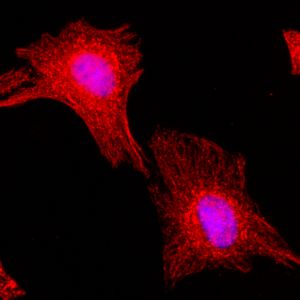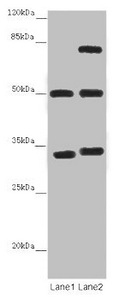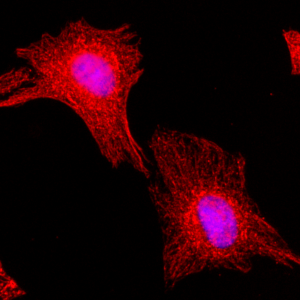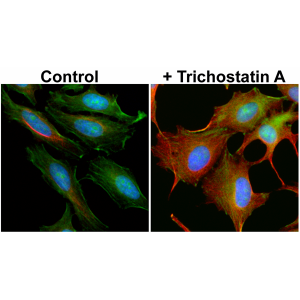
RM217 specifically reacts to human IgG4. No cross reactivity with human IgG1, IgG2, IgG3.
anti-alpha-Tubulin, Rabbit Monoclonal (RM113) (Biotin)
REV-31-1016-02
ApplicationsImmunoPrecipitation, Western Blot, ChIP Chromatin ImmunoPrecipitation, ImmunoCytoChemistry, ImmunoHistoChemistry
Product group Antibodies
ReactivityAll Species
TargetTUBA1B
Overview
- SupplierRevMAb Biosciences
- Product Nameanti-alpha-Tubulin, Rabbit Monoclonal (RM113) (Biotin)
- Delivery Days Customer2
- ApplicationsImmunoPrecipitation, Western Blot, ChIP Chromatin ImmunoPrecipitation, ImmunoCytoChemistry, ImmunoHistoChemistry
- CertificationResearch Use Only
- ClonalityMonoclonal
- Clone IDRM113
- ConjugateBiotin
- Gene ID10376
- Target nameTUBA1B
- Target descriptiontubulin alpha 1b
- Target synonymsK-ALPHA-1, tubulin alpha-1B chain, alpha tubulin, alpha-tubulin ubiquitous, tubulin K-alpha-1, tubulin alpha-ubiquitous chain, tubulin, alpha, ubiquitous
- HostRabbit
- IsotypeIgG
- Protein IDP68363
- Protein NameTubulin alpha-1B chain
- Scientific DescriptionMicrotubules are key elements of the eukaryotic cytoskeleton that dynamically assemble from heterodimers of alpha- and beta-tubulin. Microtubules function as structural and mobile elements in mitosis, intracellular transport, flagellar movement, and the cytoskeleton. Two different mechanisms can generate microtubule diversity: the expression of different alpha- and beta-tubulin genes, referred to as tubulin isotypes, and the generation of posttranslational modifications (PTMs) on alpha- and beta-tubulin. Tubulin PTMs include the well-known acetylation or phosphorylation, and others that have so far mostly been found on tubulin, detyrosination/tyrosination, polyglutamylation and polyglycylation. These PTMs might have evolved to specifically regulate tubulin and microtubule functions. - Recombinant Antibody. This antibody reacts to alpha-Tubulin, including Tubulin alpha-1A chain and Tubulin alpha-1B chain. Applications: WB, IP, ICC, IHC, ChIP. Source: Rabbit. Liquid. 50% Glycerol/PBS with 1% BSA and 0.09% sodium azide. Microtubules are key elements of the eukaryotic cytoskeleton that dynamically assemble from heterodimers of alpha- and beta-tubulin. Microtubules function as structural and mobile elements in mitosis, intracellular transport, flagellar movement, and the cytoskeleton. Two different mechanisms can generate microtubule diversity: the expression of different alpha- and beta-tubulin genes, referred to as tubulin isotypes, and the generation of posttranslational modifications (PTMs) on alpha- and beta-tubulin. Tubulin PTMs include the well-known acetylation or phosphorylation, and others that have so far mostly been found on tubulin, detyrosination/tyrosination, polyglutamylation and polyglycylation. These PTMs might have evolved to specifically regulate tubulin and microtubule functions.
- ReactivityAll Species
- Storage Instruction-20°C,2°C to 8°C
- UNSPSC41116161







